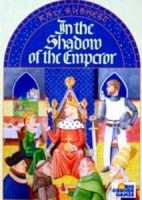
In the Shadow of the Emperor
2-4
12+
90
Germany in the late middle ages! It is a time of flourishing cities, influential bishops, the powerful popes, and a pompous aristocracy. In such a volatile climate, no dynasty can remain in power for long. Several aristocratic families seek to acquire the crown of the emporer. But this decision lies in the hands of the seven elector. 2–4 emporer candidates use their knights and cities, marry their barons, and work to influence the electors. But all efforts are useless if the candidate is not elected to be emporer. But, in the shadow of the properly elected emperor, are always those who want to displace him and become the new emperor.
User Reviews (2)
Add a Review for "In the Shadow of the Emperor"
You must be logged in to add a review.

This is a game that intrigues and befuddles me in equal measure.
At it’s core, In the Shadow of the Emperor is an area control game. It shares features with the canonical area control game, El Grande, in particular its public card selection and dual use of cards. It has an income track that determines how many actions you can take. It has an election for emperor in which you can employ dirty tricks. And it has a plethora of special powers, each of which requires skill to use effectively.
Most of the mechanisms in the game are motivated by the theme. You try to gain aristocrats, arrange marriages or obtain position in the church, attract knights, and build castles and cities, ultimately hoping to gain control of electorates (the regions in the game) and the emperor’s throne. Nonetheless, the mechanisms feel quite abstract
— except when you manage to “age” (i.e. kill, probably by poison) one of your opponents off the board.
It is hard to for me to put a finger on why the game feels so abstract. I think in part it is the game board. The board is colorful and communicates a lot of information, but it looks like a medieval version of a spreadsheet. There is no map, just tracks and boxes. In addition, there are only 5 turns, so you do not really have a sense for the passage of history.
Some of the actions are hard to flesh out thematically. Are cities really being built, or are they being chartered, taxed, designated, or just allied with? How does a doctor card allow you to age a married couple by 15 years (this does not always kill them)?
The way you control regions and the way these translate into points, money, and votes are quite intricate. Each electorate has its own powers and its own distribution of influence spaces. The emperor has a different power every turn. Victory points are earned by voting for the winning candidate, but not for being him –until the next turn. Victory points are earned for taking control of electorates but not for holding them, with an exception — there are exceptions to everything.
I don’t know enough history to say whether this provides a good feel for the way the Holy Roman Emperor got his job, but it seems authentically convoluted.
The least thematic mechanism in the game is also one I find very difficult to manage in play. The special power cards you buy come in two colors, blue and pink. Whichever color you have more of at the end of the turn determines whether you give birth to a daughter or son on the next turn. (Apparently “pink for girls” and “blue for boys” is not a medieval concept; I recently read that the idea belongs to the latter half of the 20th century.) Girls and boys have different uses in the game, and it can be hard to balance, for example, one’s desire for a girl with the unrelated actions that the cards give.
Despite having played this game several times, mostly online, I can’t say that I understand it. The game seems balanced, but due to the many details skill can come only with practice. This is a gamer’s game, but not this gamer’s game.
While this game may not have the best components or board layout, for what you pay for it, it’s a great value. The game flows nicely and has enough aspects to make you have to strategize when dealing with three other players.
It does seem however, that the game will not have a strong replay value. Every game should more or less flow the same, with your opponent’s actions being the only difference between plays.
That being said, this is not an expensive game and does give you a lot for your buck, especially if you happen to find it on sale. It is a game that if you can get at a really good price, you should. Because it’s a nice four player game that will take around a hour to an hour and a half to play.